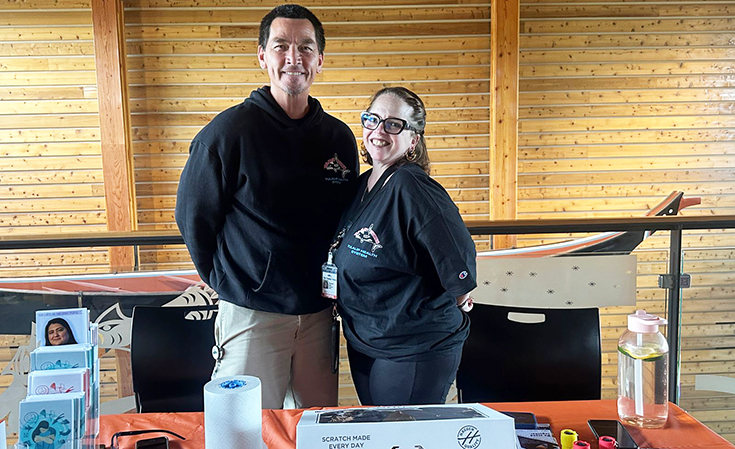
community meet and greet at the Tulalip Admin Building.
By Wade Sheldon, Tulalip News
Launched in April 2024, the Mobile Rapid Response Crisis Team (MRRCT) was created to serve the Tulalip community with timely, culturally responsive behavioral health crisis intervention. The team operates out of Tulalip Family Services. It is available to respond to both mental health emergencies and crises that may not be life-threatening but are still deeply distressing to those experiencing them.
MRRCT includes certified peer counselors, interns working toward licensure, and leadership from Rochelle Long, a Designated Crisis Responder (DCR) and Licensed Mental Health Counselor. As a DCR, Rochelle has the authority to involuntarily commit individuals who are deemed a danger to themselves or others, ensuring immediate safety and stabilization when needed.
Certified peer counselor Michael Stewart explained the team’s mission and the types of situations they respond to. “For crisis, it’s up to the individual—car accidents, death, trouble with family. Whatever you say is a crisis for you is what we are here to support,” he said. “We’re kind of like a bridge to Family Services. If someone doesn’t want to talk right away, we let them know they can come down to start the healing process. We stay with them until they get connected to a counselor.”
The team responds to calls both in person and over the phone. In-person services are available Monday through Friday, 9:30 a.m. to 8:00 p.m., with 24/7 support available via phone. “One of the team members has the phone at all times,” Stewart said. “I was on the phone at 4:50 a.m. the other day with someone in a struggle. We talked through a lot and started helping that individual.”
In the event of a mental health emergency—defined as a life-threatening situation where someone is an immediate danger to themselves or others—the Tulalip Police Department (TPD) should be called at 360-716-9911. For non-life-threatening mental health crises, MRRCT can be reached at 360-502-3365. Community members can also call 988 and select Option 4 for the Native and Strong Lifeline.
According to MRRCT’s program materials, a crisis is when thoughts, feelings, or actions prevent a person from engaging in everyday activities. It can feel overwhelming and may seem like familiar coping skills are no longer working. Crises can happen to anyone, even those without a formal mental health diagnosis.
Examples of when to call MRRCT:
- Suicidal thoughts, with or without a plan or access to weapons
- Homicidal thoughts, with or without a plan or access to weapons
- Active psychosis, including panic attacks or manic behavior
- Voluntary psychiatric hospitalization assistance
- Clinically significant mental health scores, such as moderate to severe PHQ-9/BDI
- Behavioral disruptions at school that prompt police or crisis intervention
- Older adults with dementia symptoms or wandering behaviors
- Frequent 911 callers suspected of having behavioral health needs
- Death or traumatic events, when the family or community requests support
- Suspicious activity calls, where MRRCT can help calm distressed individuals while TPD investigates
- Car accidents, when TPD requests help with de-escalating emotional responses
MRRCT also coordinates detox referrals and support for substance use-related crises in partnership with Tulalip’s Substance Use Disorder (SUD) department, which operates a 24/7 line at 425-754-2535.
The team’s flexibility and reach enable them to respond to a wide variety of situations, from de-escalating an emotional response at a car crash scene to assisting someone in completing a mental health packet and initiating therapy. Their role is not just crisis intervention but walking with individuals through their recovery journey until they are safely connected to the care they need.